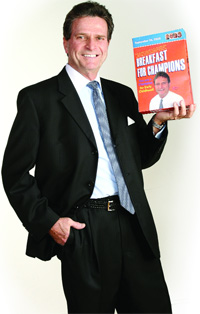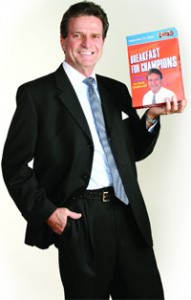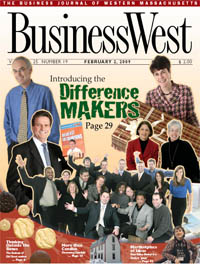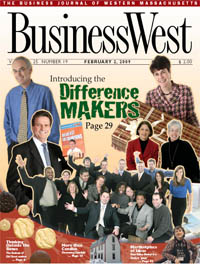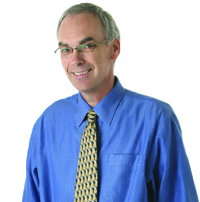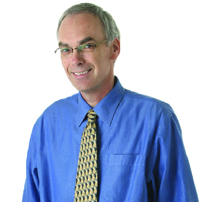Founder of GoFIT and Co-founder of Linked to Libraries
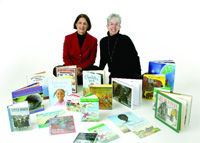
Susan Jaye Kaplan, right, with Janet Crimmins, with whom she partnered to create Linked to Libraries.
Susan Jaye-Kaplan had been on a first-name basis with Reebok Founder and CEO Paul Fireman, but she had to introduce herself to his successor, Uli Becker.
At least she thought she did.
Kaplan called Becker a few months ago (and several months after Adidas acquired Reebok, prompting changes at the top) because she needed a donation — a big donation — of sneakers for the nonprofit group she founded in 2005 called GoFIT. When she got him on the phone, she started telling him about herself and GoFIT, but quickly stopped. “I told him that, if he needed to, he could go into the files and look me up,” she told BusinessWest, adding that she was informed that such research wasn’t necessary; at that company and many others, the name, the organization, and the mission are well-known.
“I told him I needed 1,000 pairs of running shoes, and gave him specific sizes,” said Kaplan. “All he said was ‘when?’ I told him a week. He said, ‘you’ll have them.’ Not bad for someone he’d never spoken to before.”
Indeed, but then again, few people have ever really said ‘no’ to Kaplan. That’s because, when she calls or writes requesting something, there is good reason and a good cause — or causes — to which she has devoted time, energy, money, and imagination.
All of this, plus a unique ability to inspire others to find and carry out ways to give back to the community, makes her a Difference Maker.
In the case of GoFIT, the cause, as the name suggests, is fitness and introducing young people to that concept. The children are given sneakers, caps, T-shirts, and, more importantly, a game plan and some inspiration for getting into shape and staying in shape, through programs that convince participants that they have to walk before they can run — literally.
Thousands of area young people have taken part in GoFIT programs, which remain popular, despite the fact that many other organizations have borrowed from the concept, in what Kaplan considers the proverbial ‘greatest form of flattery.’
By early last year, the organization’s scope and reach had grown to such an extent that Kaplan considered it necessary to turn the reins over to an entity that had the resources and drive to handle the operation.
She and other board members found one in Square One, the Springfield-based but regional early-childhood education provider, which ‘acquired’ the GoFIT name and assets last year in what has been called a classic win-win scenario.
Kaplan remains active with GoFIT as board member, chief fund-raiser, and liaison to Reebok and other corporate supporters, as detailed earlier. But she apparently had some free time on her hands.
To fill it, she and a friend, Janet Crimmins, partnered to create another program that’s making a difference. It’s called Linked to Libraries, which collects new books and donates them to elementary schools across the region that are populated largely by the children of low-income families.
It all started when she read a story in the local paper about how Springfield’s White Street School in Springfield might have to close for — among other reasons — the fact that there weren’t enough books in the library. “I thought to myself, ‘I can fix this, in some small way,’” said Kaplan, adding that she E-mailed every member of a group she formed called the Good Reads Book Club (an organization for people too busy to join a traditional book club) and asked for donations of specific books — those recommended by Crimmins, a speech and language specialist for the city of Springfield.
“This is no exaggeration … in 11 days I had 51 hard-cover books sent to my house,” she said, adding that she and Crimmins, inspired by this success, expanded the mission. “I thought, this is a no-brainer. I can get people and corporations to donate books and help ease the problem — not solve it, just make it easier to solve.”
The program, which distributes 100 new books twice a month and will expand to three times a month this spring, has caught the attention — and won the support — of area businesses and institutions ranging from a karate school in Suffield, Conn. to Wilbraham Monson Academy; from Meyers Brothers Kalicka to Rediker Software; from Bank of Western Mass. to area high-school key clubs.
Which is good, because the demand for books is great.
“We’ve been inundated with requests from schools,” she explained, listing a number of area communities. “We’re spinning as fast as we can, but we’re not spinning fast enough; there are so many organizations and schools that need books.”
When asked what drives her in these various ventures, Kaplan returns to her youth. An orphan, she told BusinessWest that she knows what it’s like to be underprivileged; she was on her own and on the streets before graduating from high school.
She said her life was changed by a mentor named Lippman Hart Geronimus, a bacteriologist at Beth Israel Hospital who gave her a job, but also something ultimately far more valuable — a philosophy to live life by.
“He made me say the same thing every day — that I can do anything and be anything I want to be as long as I remain focused, hard-working, challenged, and honest.”
Those are the traits still propelling her today. And while Kaplan’s various endeavors have enriched the lives of thousands of young people, they’ve also enriched hers as well.
“I’m far from a millionaire, but I feel like I’ve hit the jackpot,” she told BusinessWest. “I have a good life, I’m in good health, and I have an opportunity to give back to the community.”
And while she doesn’t seek out attention or recognition for efforts, she’s reached a point where she’s become one of those individuals who really doesn’t need an introduction — not with Uli Becker, or with most of the business and civic leaders in Western Mass.v
— George O’Brien





